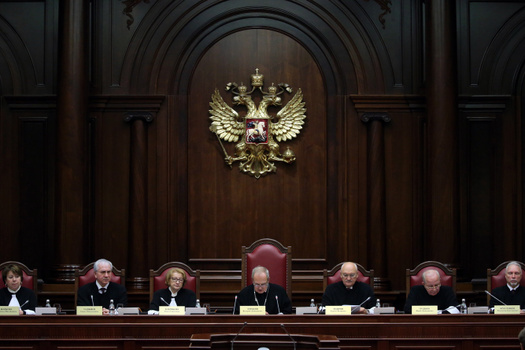
52 pages for 12 more years How Russia’s Constitutional Court justified letting Putin stick around and a whole lot more
Мы говорим как есть не только про политику. Скачайте приложение.
Russia’s Constitutional Court took all of two days to review the country’s proposed constitutional amendments and deem them legitimate. The Court’s judges also approved the procedure prescribed in the amendment bill for its own adoption, a process that has no precedent in Russian law or jurisdiction. In their ruling, the judges explained why they found that the “fundamental,” or unalterable, sections of Russia’s current constitution do not contradict a wide range of new measures, including “zeroing out” the presidential term count for Vladimir Putin. The judges also argued that banning same-sex marriage in the Constitution is not discriminatory, and neither is a preamble calling ethnically Russian people the foundation of the Russian state. The Court’s decision was not unexpected: 11 of its 15 judges are Putin appointees, including current Chief Judge Valery Zorkin. Denis Dmitriev summarized the key points of the ruling.
On free speech limits
Prohibiting speech that calls for the secession of Russian territories does, of course, place limits on free speech. However, these limits are “constitutionally acceptable.”
On religion
Including language in the Constitution about faith in God that has been passed on to us from our ancestors does not imply a rejection of secular governance or freedom of conscience. However, it will now be necessary to consider “the historically significant sociocultural role” of religion in the implementation of government policy.
On the people foundational to the Russian state
The ethnos foundational to the Russian state’s formation is the Russian ethnos. The objective recognition of this role does not diminish the merits of other ethnic groups.
On marriage as a union of a man and a woman
Russia has the right to make decisions on individual questions regarding sexual relations as well as personal relationships that are tied to sexual ones. It has the right to do so by leaning on traditional ideas of family values “in the context of the traditional and confessional composition of Russian society.” Plus, one of the purposes of the family is to produce children. Nobody can force Russia to recognize same-sex unions. Neither can a ban on them be called discriminatory. The state must not permit individuals’ rights to be violated on the basis of sexual orientation.
On the supremacy of the Constitution over international agreements
Nobody is backing out of any international agreements here. The Constitutional Court may simply allow for individual decisions made by international bodies or courts not to be enforced. However, the purpose of that power is not refusal to comply. On the contrary, it’s for “the development of constitutionally acceptable means to enforce these decisions.” Russia’s Constitution stands above all.
On increased presidential powers
Creating new mechanisms and altering existing mechanisms to shift the system of checks and balances in favor of the president is in line with the principle of separation of powers and with the nature of the presidency. For example, even now, some ministers and agencies are directly subordinate to the president, circumventing the prime minister in the chain of command. Now, this practice will simply receive constitutional legitimacy. Say a president does take extreme action such as forcing the resignation of every judge on the Supreme and Constitutional Courts. The details of such a procedure have not yet been fleshed out in writing, but it would likely only protect the judges from “unmotivated and entirely unfounded terminations of their powers.”
On stricter requirements for presidential candidates
Of course, all citizens are equal regardless of how they received citizenship, and everyone has the right to run for election. They just don’t have that right at every time or for every role. The president’s special status dictates that special requirements should be applied to candidates for that post. Here, an exception from the general rule is justified. It is necessary to guarantee that candidates have “legal and emotional (spiritual-cultural) ties to the Russian state.” That’s why we must say no to any president who is a naturalized citizen: We cannot be sure that their legal ties to Russia are stable.
The proposed ban on presidential candidates holding real estate abroad, even in the past, should not affect Vladimir Putin. An individual who has lived abroad can run for president if they were “serving the Russian Federation or the Union of SSRs” at the time.
On the nullification of presidential term counts
Why not. This transitional measure does allow Vladimir Putin to run for election in the future and, in theory, to occupy the post of president of Russia for more than two terms, even consecutively. But the citizens may still choose not to elect him. Here, too, we must consider “the concrete historical facts surrounding the selection of appropriate measures, including threat levels facing our government and society, the state of our political and economic systems, etc.” Zeroing out Putin’s term count does not threaten democracy: After all, we have a developed parliamentary system, a true multi-party system, political competition, an effective separation of powers model, and an independent court system. And anyway, every president after this will definitely be replaceable.
Summary by Denis Dmitriev
Translation by Hilah Kohen